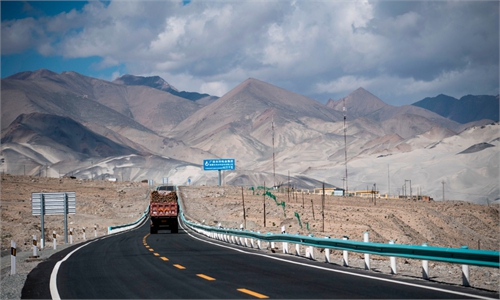ARTS / CULTURE & LEISURE
Co-produced film celebrates China-Pakistan friendship
New movie portrays how sport changes lives

Federal Minister for Heritage and Culture Syed Jamal Shah (center) awards the Pakistan-China Cultural Exchange Envoy award to producer Xie Peng (right) alongside Pakistani Ambassador to China Moin ul Haque on October 23, 2023, in Beijing. Photo: Bi Mengying/GT
"The friendship between Pakistan and China is higher than mountains, deeper than the ocean, sweeter than honey and stronger than steel. And today we are going to see such friendship through film," Pakistani Ambassador to China Moin ul Haque said on Monday ahead of the screening of the film Batie Girl.Pakistan's Federal Minister for Heritage and Culture Syed Jamal Shah, who also attended the screening in Beijing, awarded the Pakistan-China Cultural Exchange Envoy award to Xie Peng, the producer of the film.
The film Batie Girl is the first major co-production by Pakistani and Chinese producers. Translating to "Dost Larki" in Urdu, the title means "the girl from ironclad brother Pakistan." It embodies the essence of friendship between the peoples of China and Pakistan.
"The opportunity for us to work with our Chinese brothers and sisters and express our bonds through people-to-people contacts and bridges in the form of art such as film will make our friendship more resilient and more lasting," the minister told the Global Times.
The film is about the empowering journey and the growth of girls that develops around the friendship between a Chinese female engineer associated with the China-Pakistan Economic Corridor (CPEC) and a teenage Pakistani girl who share a passion for soccer. They bravely confront hardships and fight against biases, stereotypes and restrictions against girls in a remote and conservative village in Pakistan. Eventually they overcome these challenges and find their inner strength.
By showcasing cross-cultural friendship, mentorship, support and mutual growth, the story vividly portrays how sports can lead to growth and unity. It underscores women's rights and depicts how the collective efforts of young girls can impact and transform their community. It also illustrates how different cultures can coexist in harmony and also foster happiness and improvement within the community.
Xie said the film was officially released in August in Pakistan, where it generated a warm response and great feedback.
"This is an affirmation for our production of this film and an encouragement for us to continue to create Chinese-Pakistan-themed films. We will use film as a platform for China and Pakistan to serve as an envoy of Chinese culture and inherit and continue the China-Pakistan friendship," Xie said.
The narrative of the film is not just about international diplomacy, but rather a deeper, heartfelt connection between the peoples of the two nations, Xie noted.
Xie, whose hometown is in Southwest China's Sichuan Province, further explained that after the Wenchuan earthquake in 2008, Pakistan went out of its way to offer help immediately. He was deeply moved and inspired to make a film dedicated to showing the friendship between the two countries.
"From a unique female perspective, through the friendship between ordinary people in China and Pakistan, the film reflects the sincere friendship between China and Pakistan and highlights the great significance of jointly building a global community of shared future," he noted.
While trade and commerce under the China-Pakistan Economic Corridor (CPEC) have great economic importance, Shah noted that building bridges through art and culture is equally or even more significant. The minister also noted that the film reflects the growing cultural and collaborative ties between Pakistan and China.
"I think the culture corridor should be the strongest corridor, not because I'm an artist myself, but because art and culture is the best possible means of communication. It is the most effective one," Shah said.
The CPEC was launched in 2013. China put forth great efforts to help the country overcome its electricity shortage by improving infrastructure across the country. Thousands of Chinese workers and engineers went to Pakistan on CPEC projects, and hundreds of thousands traveled to China for education, professional training, business, and other opportunities. The process has significantly enhanced people-to-people contact in Pakistan.



